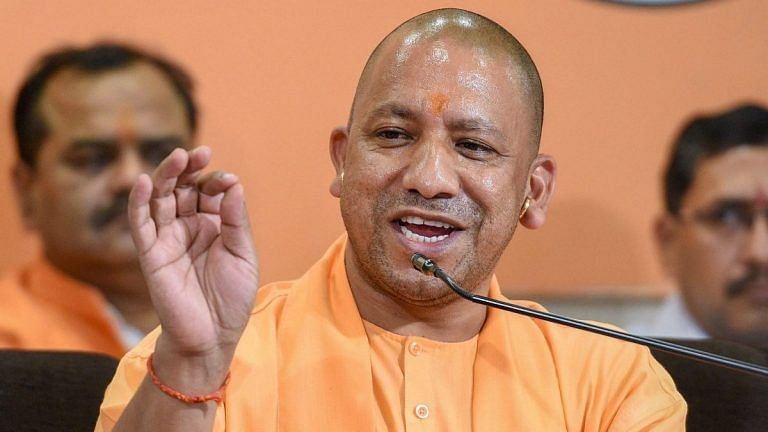
Uttar Pradesh Chief Minister Yogi Adityanath is undergoing a significant political transformation, once again positioning himself as the face of hardline Hindutva. This shift comes at a crucial moment as ten key assembly seats in Uttar Pradesh prepare for by-elections.
For Yogi, these elections are more than just routine political contests—they represent a high-stakes battle for personal and political prestige. Having faced setbacks both within his party and on the national political stage, Yogi is employing every tool in his arsenal to consolidate Hindu votes and neutralize his opposition, whether it be external rivals or internal dissenters.
Yogi’s renewed emphasis on Hindutva—the ideological force that catapulted him into national prominence—seems to be a calculated strategy to rally Hindu voters around a common cause. His message is simple but powerful: Hindu unity is essential to protect community interests, and any division among the electorate could prove catastrophic. Yogi has woven this narrative into potent symbols like the Ram Mandir and Hindu pride, presenting them as central to a broader cultural resurgence.
Shift to Hardline Messaging
The first clear indication of Yogi’s shift towards a more hardline stance came on August 24, when he raised the provocative slogan *"Katoge to Batoge"* ("If you divide, you will be cut down") in response to reports of Hindu persecution in Bangladesh. This phrase, designed as a stark warning against disunity, was a direct appeal to Hindu voters. The rhetoric only escalated on September 22 and 23, when Yogi echoed similar sentiments at rallies in Karnal, Haryana, and Mirzapur, Uttar Pradesh, respectively. With a critical by-election looming in Majhwan (Mirzapur district), Yogi’s message was unequivocal: *"Hum bate the, tou kate the"* ("We were decimated because we were divided").
In these speeches, Yogi frequently invoked the destruction of the Ram temple by invaders as a cautionary tale of what happens when Hindus are divided. The underlying message to voters is clear: unity is strength, and division leads to downfall.
A Calculated Political Strategy
Yogi’s pivot to hardline Hindutva is not mere rhetoric—it is a carefully calculated strategy designed to bolster his standing ahead of these crucial by-elections. He understands that his political future, as well as his stature within the BJP, depends heavily on the outcome. Recent losses in Uttar Pradesh have emboldened his internal critics, and these elections serve as a litmus test for his leadership. A poor showing could provide his detractors with the leverage they need to challenge his authority within the party.
Political analyst Rajendra Kumar succinctly notes, “If Yogi fails to sweep these by-elections, his opponents within the BJP will use the defeat to undermine him. His leadership could face serious scrutiny. His emphasis on Hindu pride, unity, and slogans like ‘Katoge to Batoge’ are not random—they're deliberate moves to consolidate his power base.”
High-Stakes By-Elections
The upcoming by-elections are far more than contests for a few legislative seats; they represent a test of Yogi’s political survival. The ten constituencies in play—Karhal (Mainpuri), Sisamau (Kanpur), Milkipur (Ayodhya), Ghaziabad, Katheri (Ambedkar Nagar), Majhwan (Mirzapur), Phulpur (Allahabad), Kundarki (Moradabad), Khair (Aligarh), and Meerapur (Muzaffarnagar)—span regions where the BJP’s dominance has come under increasing pressure. A defeat in these areas could allow Yogi’s critics to openly question his influence and leadership.
Yogi is acutely aware of the stakes, and his political future rests on securing a decisive victory. By invoking emotionally charged issues like the Ram Mandir and the persecution of Hindus abroad, he is attempting to unite Hindu voters around a shared identity. His warnings about the dangers of division, paired with the symbolic importance of the Ram Mandir, aim to galvanize voters beyond just politics—this is about cultural identity and pride.
Betting on Hindutva
In the lead-up to the elections, Yogi is expected to intensify his focus on themes of Hindu unity, cultural identity, and pride. This approach mirrors the fervor that once positioned him as a Hindutva champion. With his career and the BJP’s dominance in Uttar Pradesh hanging in the balance, Yogi is making a significant bet that hardline Hindutva will not only secure his victory in these by-elections but will also shape the state’s political landscape for years to come.
As the elections draw nearer, it will become clear whether Yogi’s gamble on Hindutva will pay off or if internal and external pressures will chip away at his once unassailable political standing. The results will offer critical insights into the future direction of both Yogi’s leadership and the broader political currents in Uttar Pradesh.